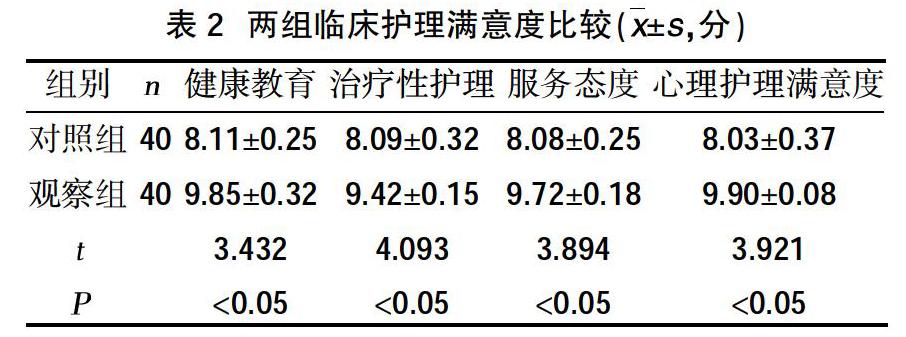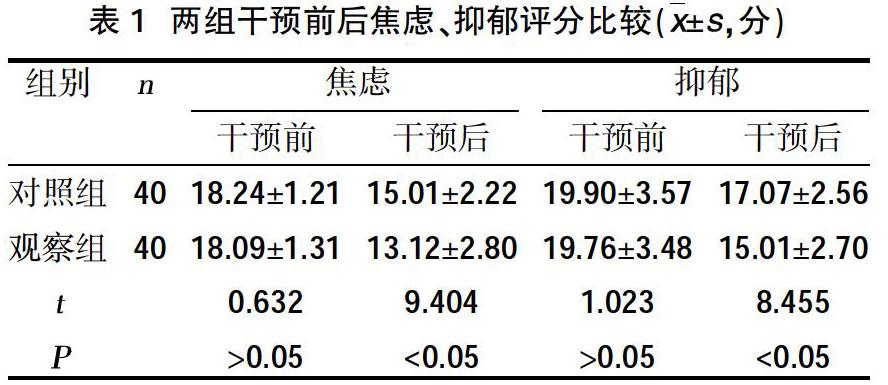情绪管理对脑梗死患者焦虑、抑郁及睡眠障碍的影响
王锡锦


摘要:目的 研究情绪管理对脑梗死患者焦虑、抑郁及睡眠障碍的影响。方法 选取2016年6月~2017年1月在我院诊治的80例脑梗死患者为研究对象,采用随机数字表法分为对照组和观察组,各40例。对照组采用常规护理,观察组在对照组基础上采用情绪管理,比较两组临床患者干预前后焦虑、抑郁、睡眠质量评分以及护理满意度。结果 干预后两组焦虑、抑郁评分均低于干预前,且观察组低于对照组(P<0.05);干预后两组睡眠质量评分均低于干预前,且观察组低于对照组(P<0.05);观察组护理满意度高于对照组(P<0.05)。结论 脑梗死患者应用情绪管理有助于改善患者焦虑、抑郁情绪,提高其睡眠质量及护理满意度,值得临床应用
关键词:情绪管理;脑梗死;焦虑;抑郁;睡眠障碍
中图分类号:R473.74 文献标识码:A DOI:10.3969/j.issn.1006-1959.2020.17.058
文章编号:1006-1959(2020)17-0186-02
Abstract:Objective To study the effect of emotional management on anxiety, depression and sleep disorders in patients with cerebral infarction. Methods A total of 80 patients with cerebral infarction who were diagnosed and treated in our hospital from June 2016 to January 2017 were selected as the research objects. They were divided into the control group and the observation group by random number table method, with 40 cases in each group. The control group used routine nursing care, and the observation group used emotion management on the basis of the control group. The anxiety, depression, sleep quality scores and nursing satisfaction of the two clinical patients were compared before and after intervention.Results After the intervention, the anxiety and depression scores of the two groups were lower than those before the intervention, and the observation group was lower than the control group(P<0.05); the sleep quality scores of the two groups after the intervention were lower than those before the intervention, and the observation group was lower the control group(P<0.05); the observation group's nursing satisfaction was higher than the control group(P<0.05).Conclusion The application of emotional management in patients with cerebral infarction could help improve patients' anxiety and depression, improved their sleep quality and nursing satisfaction, and was worthy of clinical application.
Key words:Emotion management;Cerebral infarction;Anxiety;Depression;Sleep disorders
腦梗死(cerebral infarction)是临床常见脑血管疾病,致残、致死率高,严重影响患者的生命健康和生活质量。早期溶栓治疗可一定程度缓解病情,降低致残、致死率,但大部分患者仍然存在不同程度的功能障碍、睡眠障碍、肢体偏瘫等后遗症,患者容易产生焦虑、抑郁等负性情绪,增加复发风险,影响患者良好预后的形成。临床常规护理干预有助于改善患者不良心理情绪和睡眠障碍,促进患者的良好康复。研究显示[1],脑梗死患者护理中应用情绪管理,可以针对性改善患者负性情绪,但是具体的改善效果、护理满意度以及对睡眠质量的影响尚存在争议。本研究结合2016年6月~2017年1月在我院诊治的80例脑梗死患者临床资料,研究情绪管理对脑梗死患者焦虑、抑郁及睡眠障碍的影响。现报告如下:

